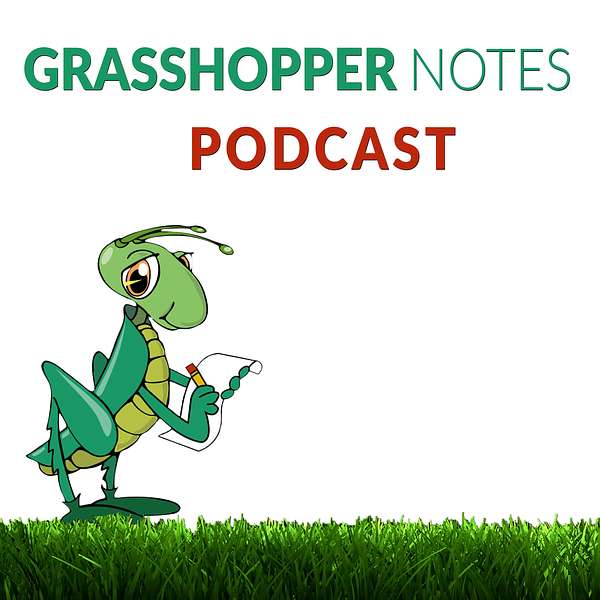
Grasshopper Notes Podcast
The Grasshopper Notes Podcast is hosted by John Morgan the man who has been billed as America’s Best Known Hypnotherapist.
John’s podcasts are a collection of guided meditations and bite-sized, mini podcasts which open you to new ways of thinking, communicating, and responding. You get a finer appreciation of how your mind works and how to use your internal resources to your best advantage.
See a video of John's background at the following link: https://www.youtube.com/watch?v=XbCPd00ok0I
In short, John Morgan is a people helper. Explore this channel and see what he can help you discover.
Grasshopper Notes Podcast
Shameless Apology
Use Left/Right to seek, Home/End to jump to start or end. Hold shift to jump forward or backward.
There's a difference between guilt and shame. Find out what it is in this mini podcast.
Grasshopper Notes are the writings from America's Best Known Hypnotherapist John Morgan. His podcasts contain his most responded to essays and blog posts from the past two decades.
Find the written versions of these podcasts on John's podcasting site: https://www.buzzsprout.com/1628038
"The Grasshopper" is the part of you that whispers pearls of wisdom that seem to pop into your mind from out of the blue. John's essays and blog posts are his interpretations of these "Nips of Nectar." Others have labeled his writings as timeless wisdom.
Most of the John's writings revolve around self improvement and self help. They address topics like:
• Mindfulness
• Peace of mind
• Creativity
• How to stay in the present moment
• Spirituality
• Behavior improvement
And stories that transform you to a wider sense of awareness that presents more options. And isn't that what we all want, more options?
John uploads these podcasts on a regular basis. So check back often to hear these podcasts heard around the world. Who wants to be the next person to change?
Make sure to order a copy of John's new book: WISDOM OF THE GRASSHOPPER – 21 Days to Creativity. These mini-meditations take you inside where all your creative resources live. And you'll come out not only refreshed but recommitted to creating your future.
It's only $16.95 and available at BLURB.COM at the link below. https://www.blurb.com/b/10239673-wisd...
Also, download John's FREE book INTER RUPTION: The Magic Key To Lasting Change. It's available at John's website https://GrasshopperNotes.com
Shameless Apology
Shame on me for not recording this old Grasshopper Note sooner. It’s an eye-opener.
"Guilt And Shame Are Not The Same: One Triggers An Apology The Other Can't Muster."
It has intrigued me for a number of years that a certain portion of the population has trouble apologizing. From my vantage point, it’s always been about immaturity, but it goes deeper than that for some. It’s about shame.
A stubborn, immature teenager avoids apologies more than cleaning their room. That’s par for the course. It’s something most of us outgrow.
But there is something more than immaturity that keeps an apology in one’s pocket for a lifetime. It’s shame.
I perceived guilt and shame as identical twins until I read something from Dr. Paul Ekman. He’s the man the TV show “Lie To Me” was based upon.
He wrote: “Guilt is felt about an action that we know was wrong. Shame is felt not about an action but about who and what we are; if anyone really knew who and what we are, they would be repulsed. Guilt motivates a confession of wrong doing, shame inhibits it.”
What I get from that is that some people are so ashamed that they can't admit their guilt. It would be like having their dirty little secret go viral on YouTube. Sadly, instead, it goes unwashed to the grave with them.
The cleansing power of an apology is like a rising tide – it lifts all boats.
If you choose to lift the pain of your shame, you also lift the radiating pain for all who suffer from your silence.
Our secret is so encased in our social mask that removing it would mean that we would disappear. Losing this false identity is perceived as a fate worse than death. That’s why we take pains to hold on tightly to our mask and shame.
Here's a big secret: We are not who we pretend to be.
We have a conditioned portion of us that has taken on a life of its own, separate and apart from our depth, and it masquerades as us on the surface.
When you apologize, you crack the mask and you crack the code for allowing shame to disappear.
You can still feel guilty about your actions if you choose, but, once released, you’ll never choose the pain of shame again.
Just remember this: You don’t have to apologize for who you are, just who you aren’t. You aren’t a container for shame.
All the best,
John
